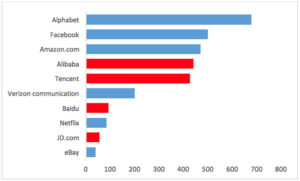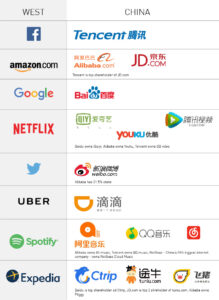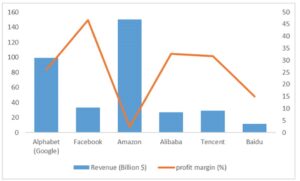
The Chinese digital giants – coming to a store near you!
Back in 2010, almost all unicorn start-ups came out of North America or Europe, whereas Chinese success stories were hard to come by; Alibaba was not yet listed on the Nasdaq and Tencent’s remarkable social media platform Wechat was not even born. In short, China’s reputation was still one of a copycat producer of Western innovation. But times, they are a-changing!
According to data from CB Insights, one in every three unicorns today is born in China. The top Chinese tech giants, Baidu, Alibaba and Tencent (collectively referred to as BAT), have as strong an influence on the Chinese stock market as Facebook, Amazon, Netflix, and Google (FANG) have in the United States.
They are big – all three are among the world’s top 10 Internet companies by market capitalization (see Figure 1).
Figure 1: The market capitalization of the world’s top 10 Internet companies (Yahoo Finance, October 25 2017)
They are cash-rich, innovative, and actively investing in new ventures. In fact, BAT are involved in almost all Chinese Internet ventures of significant size (see Figure 2).
Figure 2: Dominant Western Internet companies and their Chinese counterparts
Baidu – the Google of China
Baidu is the most popular search engine in China, both on desktop and mobile devices. Baidu covers more than 80% of the Chinese market. Like Google, Baidu also provides maps, translation, and cloud storage services, and is currently developing a self-driving car. Earlier this year, Baidu opened the source code for its autonomous driving platform to facilitate accelerated progress.Unlike Google, Baidu has invested heavily in Online to Offline (O2O) services, which let users connect with nearby activities through location-based apps. However, Baidu is believed to be lagging behind its Chinese competitors. Within the ride-hailing services sector, for example, Baidu first invested in Uber China in December 2014. As a comparison, its rivals Alibaba and Tencent invested in Kuaidi Dache and in Didi Dache, respectively, back in 2013. Baidu also made a massive $3.2 billion investment in Nuomi, the market’s number three within the group-buying service, but it has turned out to be only a marginal competitor to the merged market leader Meituan-Dianping.
Baidu has been criticized for not being able to diversify its income sources. Though the video revenue from iQiyi reached $1.6 billion (16% of total revenue) last year, it is still losing money. Its profits rely heavily on advertising.
Baidu intends to expand beyond China. The company’s preferred region is Southeast Asia, South America, and the Arabic-speaking world, and it claims that its services already extend to more than 200 countries. Last year, however, 99% of Baidu’s revenue came from China, whereas Google generated less than half of its revenue from the United States.
Alibaba – the Amazon of China
Most Westerners know very little about Alibaba, except that it is the Amazon of China. This is not completely wrong; just like Amazon, Alibaba’s growth has been largely driven by its e-commerce business, complemented by cloud services. Moreover, both companies dominate their home markets. But unlike Amazon, Alibaba is not a seller. “Alibaba is not an e-commerce company, it is an e-commerce enabler.” Jack Ma, the founder of Alibaba recently stated at the Bloomberg Global Business Forum in New York, when compared with Amazon.
Alibaba has a more complex platform ecosystem than Amazon, including Taobao.com (c2c), Tmall.com (b2c), 1688.com (b2b), and aliexpress.com (international portal). In addition to its direct e-commerce sites, Alibaba also owns a PayPal-like service called Alipay – a dominant player in the online and mobile payment market. Alibaba’s Yu’e Bao allows consumers to save and invest money “left over” in digital wallets into a market fund and earn interest. With Ant Financial, the company also provides access to credit for consumers and small businesses via Sesame Credit – which calculates credit scores based on shopping transactions. In short, Alibaba is transforming China’s payment and micro finance industry.
Alibaba earns less revenue than global peers (see Figure 3), making most of its money by charging merchants for advertising and transaction fees; 60% of its revenue comes from Alimama, its advertising platform. That also makes Alibaba’s net profit margin exceptionally high.
Figure 3: Revenue and net income (data source yahoo finance)
Despite these obvious differences, Alibaba and Amazon will continue to be compared to each other. They are locked in a battle to become the world’s largest e-commerce firm by market capitalization. On October 11, 2017, after more than two years, Alibaba’s market capitalization topped Amazon’s for a short period of time. As both Alibaba and Amazon look to expand overseas into similar markets, the battle between the two will only intensify. Recently, Alibaba released the new Tmall Genie – a voice-controlled smart home assistant – as a direct challenge to Amazon’s echo. Similarly, Amazon’s blockbuster purchase of Whole Foods could be viewed as an attempt to change the entire grocery shopping experience, much like Alibaba’s Hema has done for fresh food in China. The next battleground is in Southeast Asia, where the ecommerce market is believed to be relatively untapped and fragmented.
Tencent – the Facebook of China
Tencent is best known for its instant messaging and social media platforms – Wechat and QQ, which have almost one billion active accounts each. Like Facebook, Tencent has diversified its services beyond social media and chat apps. Tencent’s “other” businesses are performing astonishingly well. Its online payment service Tenpay is rapidly closing the gap with market leader Alipay. Tencent’s web-based entertainment portal QQ.com is one of the largest web portals in China. Tencent is expanding Wechat’s ecommerce platform and has become a major shareholder in JD.com, the country’s second-largest e-commerce firm.
Unlike Facebook, Tencent is a giant in the gaming industry. According to Newzoo, Tencent is the world’s largest video game publisher by game revenue, and currently owns 13% of the world’s video gaming market. Tencent’s Chinese MOBA game “Honour of Kings” is the most profitable game worldwide in the mobile segment. Tencent is also spending heavily to acquire game developers globally. Back in 2013, Tencent invested in EPIC Games. In June of 2016, Tencent bought an 84% stake in Supercell, the maker of Clash of Clans, for $8.6 billion, setting a new record for the acquisition of a video game maker.
Not surprisingly, a majority of Facebook’s revenue is from advertising, and mostly from its mobile settings. This is not the case for Tencent. More than half of its revenue is generated from online gaming. Tencent’s advertising makes up only about 14% of its total revenue – including ads from other Tencent companies, such as QQ video.
As the BATs start to saturate the Chinese market, it is inevitable that they will look elsewhere for growth. Their first moves have been regional, to South East Asia and India. However, they have their eyes squarely on the large and lucrative markets of Europe and North America. The BATs are likely to enter these markets with a strong value proposition and aggressive marketing. Local players should prepare for a lengthy and costly battle.
Michael Wade is director of the Global Center for Digital Business Transformation at IMD, and co-author of Digital Vortex: How Today’s Market Leaders Can Beat Disruptive Competitors at Their Own Game.
Jialu Shan is Research Associate at the Global Center for Digital Business Transformation, an IMD and Cisco Initiative.
Research Information & Knowledge Hub for additional information on IMD publications
Earlier this month, the European Union began executing its tariffs on China for electric vehicle (EV) imports, yet the dated practice of taxing pro...
The increasing datafication of the workplace is often cast as a means of imposing organisational and managerial control on workers. This reflection...
Research Information & Knowledge Hub for additional information on IMD publications
Research Information & Knowledge Hub for additional information on IMD publications
Research Information & Knowledge Hub for additional information on IMD publications
Research Information & Knowledge Hub for additional information on IMD publications
in Scandinavian Journal of Information Systems July 2024, vol. 36, no. 1, article 2
Research Information & Knowledge Hub for additional information on IMD publications
in I by IMD 27 June 2024
Research Information & Knowledge Hub for additional information on IMD publications
Research Information & Knowledge Hub for additional information on IMD publications
in I by IMD Magazine June 2024, no. 14, pp. 48-53
Research Information & Knowledge Hub for additional information on IMD publications
Research Information & Knowledge Hub for additional information on IMD publications
Research Information & Knowledge Hub for additional information on IMD publications










